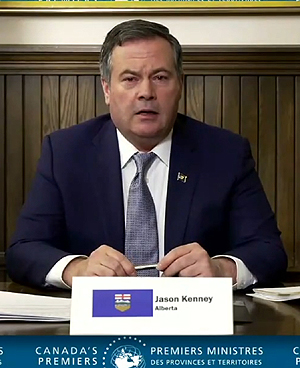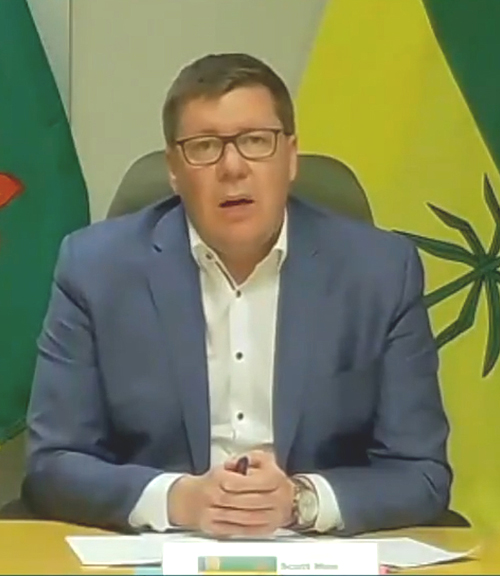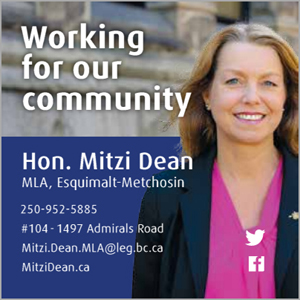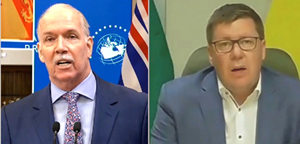
Friday February 4, 2022 | VICTORIA, BC | NATIONAL
by Mary P Brooke, Editor | Island Social Trends
The ask has been continual, over 40 meetings in the past two years, for an increase to Canada Health Transfer funding from federal to provincial coffers.
That’s what BC Premier John Horgan — as Chair of the Council of the Federation — led with today in a livestreamed media teleconference out of Victoria, along with the premiers of all Canada’s provinces and territories through a virtual interface (carried on BC Government livestream platforms on Facebook, Twitter and YouTube, as well as by CPAC).
Horgan referred to all 13 premiers as “willing partners” in asking Prime Minister Justin Trudeau for increased federal financial contributions toward the health-care systems that provinces and territories are responsible to maintain.
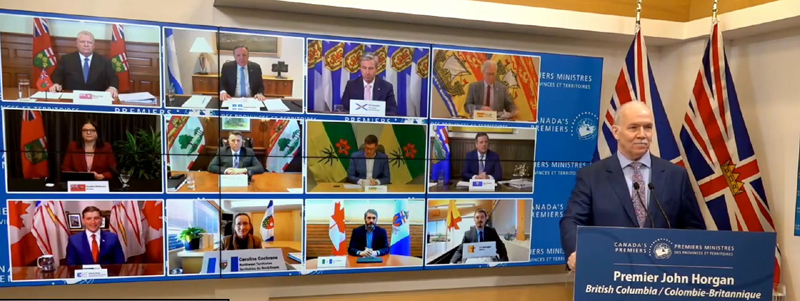
Through the health-care systems, provinces and territories are required to deliver health-care to their populations. If funding is not adequate, the impacts will be detrimental to the level and quality of care, is what the premiers argue.
It also means that the portion of the provincial budgets earmarked for health-care will be inadequate to deliver the care people need — especially post-pandemic, including the increased need for mental health support and all the longer-term impacts of COVID on people’s physical health which will arise as chronic disease and/or worsened conditions for ailments for which treatment got postponed in the past two years.
Premiers weigh in:
- Alberta Premier Jason Kenney said that health-care is a provincial responsibility but that federal funding is needed, calling on the federal government to “pay its fair share”. in particular, Kenney remarked that “the response to COVID needs to change as the disease and the threat change”. As an example, he noted that community transmission of the current Omicron variant can’t be controlled by travel restrictions
- Saskatchewan Premier Scott Moe said today that the budget strain for all provinces and territories is unsustainable and that this matters to every Canadian. He said about health-care delivery by provinces that “many of those challenges have been in the health-care system for some time”. Premier Moe articulated at least three things that Canadians will need and want to see as part of health-care delivery across the country: access to mental health in the community, a reduction in surgical wait times, and increases in hospital bed and ICU capacities. Indeed, without an adequate and available health-care system, people’s individual lives and the functioning of the economy and society around them will be impacted. Businesses and jobs and all economic sectors will be impacted. Individuals, families and communities will feel the impacts of health-care needs that go under-attended or fully unattended in the coming years.
- Nova Scotia Premier Tim Houston today said “we all want to get through time, we all want to do our part”, as to how the health-care system and population of his province have been dealing with the COVID challenge which has now continued for two years.
- Prince Edward Island Premier Dennis King said the cost of health-care delivery in PEI has gone up seven to eight percent every year. He said that “consistent long-term funding” is the key. Provinces will provide health-care services “but won’t be able to offer other programs as well”.
Saskatchewan leadership, then and now:
Today Premier Moe called the premiers’ request for an increase to the Canada Health Transfer “an opportunity for the federal government to really participate” in “what health-care means to Canadians”, calling it a fork in the road.
It’s a chance for the federal government to truly turn the page on how all Canadians experience the health-care for all approach that has been the bedrock of Canadian society since the mid-1960s.
It was the Saskatchewan government had opened the door to universal health care in 1961. Within 10 years of the Saskatchewan strike by doctors, the entire country was covered by medicare.
Premier John Horgan has often noted how he was influenced during his university years by an interaction with Tommy Douglas — the ‘father of universal health care’ in Canada, becoming motivated to maintain and build the health-care infrastructure in this country.
Rebalancing the funding:
When universal health care was established, it was evenly funded between the federal and provincial governments. Now the provinces are covering about 80 percent of the costs, and the shared view of the premiers today was that provincial and territorial deficits will become unsustainable.
Wherever the money comes from (federal or provincial) health-care services, by law, must continue in Canada. Somewhere, budget priorities will need to shift, so that health-care comes out the winner.
If the federal government sees health-care as a top Canadian lifestyle priority, then federal leadership may be well-served politically to come out in front of a call for better health-care delivery scenarios right across the country.
So far, the repeated request for an increase in the CHT amount toward provinces and territories has been made within the parameters of not having any conditions placed upon how the funding is spent.
Today COF Chair Horgan said there are already plenty of accountability processes in place including budgets and reports.
National Health-Care survey:
Today, Canada’s Premiers released the results of a national survey conducted by Leger (during January 6 to 17, 2022) on Canadians’ attitudes to health-care.
The cost of living and issue of affordability were the only priority that was higher to Canadians than health-care, according to the survey of 2,614 people. The third priority was the impact of climate change, followed by the impacts of COVID-19, and the cost of housing.
These are the key findings, as presented by the Council of the Federation:
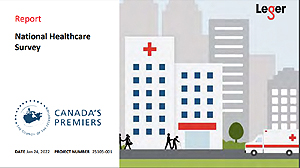
- The vast majority (87%) of Canadians agree that an immediate increase in funding and resources is needed to help alleviate the considerable strain the pandemic has put on their province or territory’s healthcare system.
- 78% of Canadians agree that for long-term improvements in healthcare the federal government’s funding must be sustainable and maintained over time.
- Few Canadians (22%) believe that the federal government currently provides an adequate amount of funding to provinces/territories to properly deliver health services to citizens and even fewer (10%) believe this when they learn that funding has declined from 50% to 22% since 1960.
- 65% of Canadians agree that their provincial or territorial government is best able to determine healthcare spending needs in their province/territory compared to 11% who believe that the federal government is best able.
- 84% believe that provinces and territories should have the flexibility to adapt healthcare funding to their specific needs.
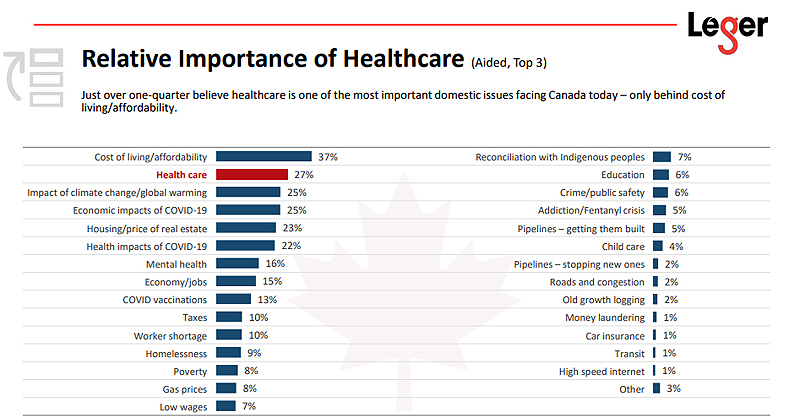
Vancouver Island impact:
Here on Vancouver Island, Parksville-Qualicum MLA Adam Walker says Premier Horgan’s push for increased federal health-care funding benefits Vancouver Island.
Walker reiterated the stance that investments in priority areas of health-care are the future for the health-care system including long-term care, mental health and addictions care, and access to primary care.
A shortage of primary care doctors has surged to about 100,000 on Vancouver Island in recent years. Burdening the population further, at least three walk-in primary care clinics in the Greater Victoria area will be closing by the end of April (including the Eagle Creek clinic in View Royal, the walk-in clinic in Colwood, and a clinic on Burnside Road).
Last month local MLA Mitzi Dean (Esquimalt-Metchosin) called the upcoming clinic closures “devastating news”. View Royal Mayor David Screech said that “All round, it’s a bad situation for View Royal and the greater area.”



